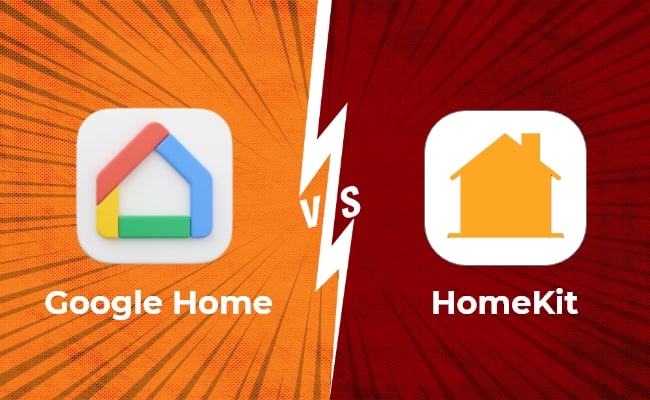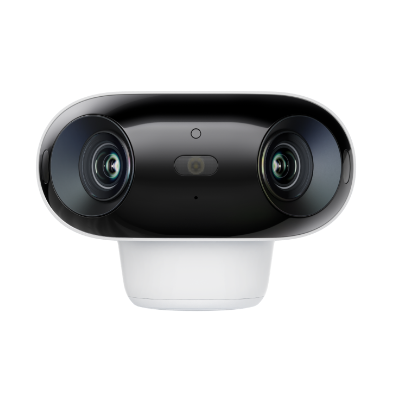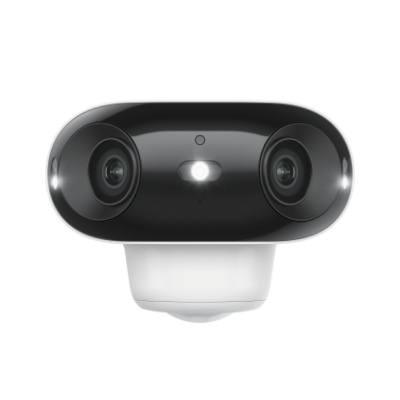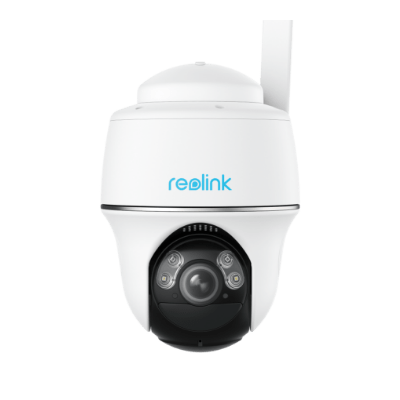HomeKit vs. Google Home: Full Comparison

In the recent years, two prominent platforms have emerged as leaders: Apple Homekit vs Google Home. These intuitive systems have transformed the way we interact with and control our homes, offering a seamless and automated living experience.
As the demand for smart home integration continues to grow, it's essential to understand the key differences between these two platforms to determine which one best fits your needs.
Apple HomeKit vs Google Home: Understanding the Basics
Let's start with the basics of these two smart home platforms.
What is Apple HomeKit?
Apple HomeKit is a framework developed by Apple that allows users to control various smart home devices, such as lights, thermostats, locks, and cameras, through their Apple devices. HomeKit provides a centralized platform for managing and automating these connected devices, making it easier for users to create customized settings and routines. With the integration of Siri, Apple's virtual assistant, users can issue voice commands to control their smart home features, adding an extra layer of convenience to the experience.
What is Google Home?
Google Home, on the other hand, is Google's smart home platform that offers a similar set of features. Powered by the Google Assistant, Google Home allows users to control compatible smart home devices, set reminders, check the weather, and even play music through voice commands. The platform is designed to work seamlessly with a wide range of smart home products, providing users with a comprehensive and integrated smart home experience.
Google Home vs HomeKit: Key Differences
The main difference between homekit and google home lies in their ecosystem compatibility: Homekit is s tightly integrated with the iOS ecosystem and works seamlessly with Apple devices such as iPhones, iPads, and Macs, while Google Home operates over Android ecosystem and is compatible with Android smartphones, tablets, and Chromebooks.
Apart from this, they also differ in the following aspects:
Central Hub
One key difference between Google Home and Apple HomeKit lies in their central hub approach. Google Home utilizes a physical device, the Google Home speaker, as the central control hub for your smart home. This hub enables voice control and coordination of compatible devices. In contrast, Apple HomeKit does not require a dedicated physical hub.
Voice Assistants
Another significant distinction is the voice assistants powering these platforms. Google Home is powered by the Google Assistant, a highly capable voice assistant that can understand natural language and perform a wide range of tasks, from setting reminders to answering complex queries. Apple HomeKit, on the other hand, is integrated with Siri, Apple's virtual assistant, which offers voice control capabilities for smart home devices.
Compatible Devices
The range of compatible devices is another area where Google Home and Apple HomeKit differ. Google Home boasts a broader ecosystem of compatible smart home devices, with support for a vast array of brands and product categories, including lights, thermostats, security cameras, and more. Apple HomeKit, while growing its compatibility, has a more curated approach, requiring device manufacturers to undergo a certification process to ensure compatibility and security.
Platform Integration
The platform integration capabilities of Google Home and Apple HomeKit also vary. Google Home seamlessly integrates with the broader Google ecosystem, allowing users to access features like Google Calendar, Google Maps, and other Google services. Apple HomeKit, on the other hand, is more tightly integrated with the Apple ecosystem, offering deeper integration with iCloud, Apple Music, and other Apple-specific services.
Ease of Use
Both Google Home and Apple HomeKit aim to provide a user-friendly smart home experience, but their approach to ease of use differs. Google Home is often praised for its intuitive voice commands and the simplicity of its companion app, making it accessible to a wide range of users.
Other Services
Google Home and Apple HomeKit also offer unique additional services that cater to different user needs. Google Home integrates with a wide range of other Google services, such as Google Calendar, Google Maps, and Google Assistant, providing a seamless experience for users who are deeply embedded in the Google ecosystem.
Apple Home vs Google Home: Pros & Cons
For a detailed comparison. we should also learn about their strengths and weaknesses.
Apple HomeKit: Pros & Cons
Pros:
- Tight integration with the Apple ecosystem, providing a seamless experience for Apple users
- Strong focus on privacy and security, with data encryption and secure communication between devices
- Versatile automation and customization options, allowing users to create personalized routines and triggers
- Robust Siri voice assistant capabilities for voice control of smart home devices
Cons:
- Limited device compatibility compared to Google Home, as it requires manufacturers to undergo a certification process
- Higher cost of entry, as HomeKit-compatible devices are typically more expensive than their non-certified counterparts
- Steeper learning curve for users who are not familiar with the Apple ecosystem
Google Home: Pros & Cons
Pros:
- Broader ecosystem of compatible smart home devices, offering a wider range of product choices
- Seamless integration with the Google ecosystem, providing access to a wide range of Google services
- Intuitive voice control and natural language understanding through the Google Assistant
- Relatively lower cost of entry, with a variety of affordable Google Home devices available
Cons:
- Less emphasis on privacy and security compared to Apple HomeKit, as Google collects user data for its own services
- Automation and customization options may be more limited compared to Apple HomeKit
- Occasional compatibility issues with non-Google branded smart home devices
HomeKit vs Google Home vs Alexa: Comparison Table
When considering smart home platforms, it's essential to also factor in Amazon's Alexa, another dominant player in the market. Let's take a closer look at comparison between Apple Homekit vs Google Home vs Alexa:
Google Home vs Apple HomeKit: Which to Choose?
When deciding between Google Home vs Apple Homekit, several key factors should be considered:
- Affordability: If budget is a primary concern, Google Home offers more affordable entry-level options compared to the typically higher-priced Apple HomeKit-compatible devices.
- Compatibility with Existing Devices: Google Home's broader ecosystem of compatible devices may be a better fit if you already have a diverse range of smart home products from various manufacturers. Apple HomeKit's more curated approach may be better suited for those invested in the Apple ecosystem.
- Privacy and Security: Apple HomeKit's focus on privacy and security, with features like data encryption and secure communication, may be more appealing to users who prioritize these aspects.
- Automation Options: Both platforms offer automation capabilities, but those seeking more robust and customizable routines may find Apple HomeKit to be the better choice.
Ultimately, the decision between Google Home and Apple HomeKit will depend on your specific smart home needs, budget, and the level of integration you desire with your existing devices and ecosystem.
Best Security Camera for Google Home Integration
Most Reolink security cameras are compatible with Google Assistant. Here are some best picks:
4K Wi-Fi Security Camera Compatible with Google Home - Reolink Argus 4 Pro
If you're looking for a WiFi security camera compatible with Google Assistant, the new Reolink Argus 4 Pro is an excellent option. This dual-lens camera offers a 180-degree field of view, providing comprehensive surveillance for your smart home. It's easy to set up and integrate with your Home Assistant system.
This battery-powered model excels in night vision, offering full-color footage without relying on visible spotlights. Its large lens aperture and advanced image sensor enhance light sensitivity. Additionally, the wire-free design allows for versatile placement both indoors and outdoors around your home.
4k 180° Wire-free Color Night Vision Camera
4K UHD 180° Blindspot-free View; Color Vision Day and Night; 30% More Battery Life; Dual-band Wi-Fi 6; Smart detection.
For users requiring full-color night vision without apparent spotlights, the Reolink Argus 4 Pro is the best option. Alternatively, if you desire an affordable choice that still delivers effective performance, the Argus 4 standard version is worth considering.
4k 180° Blindspot-free Wi-Fi 6 Camera
4K UHD 180° Blindspot-free View; Dual-band Wi-Fi 6; Smart detection; Easy Installation Anywhere
4G Cellular Surveillance Camera that Works with Google Home - Reolink Go PT Ultra
One impressive smart home device that seamlessly integrates with Google Home is the Reolink Go PT Ultra. This 4K 8MP wireless 4G LTE battery-powered security camera offers a range of advanced features, making it an excellent choice for Google Home users.
The Reolink Go PT Ultra boasts a 4K 8MP ultra-high-definition camera, delivering crystal-clear video footage. Powered by a rechargeable battery or solar panel, this camera can be placed virtually anywhere, providing flexibility in installation and placement. With its 355-degree pan and 140-degree tilt capabilities, the camera can cover a wide area, ensuring comprehensive coverage of your property.
4K 8MP Wire-Free 4G LTE PT Battery Camera
4K 8MP; Smart Detection; 355° Pan & 140° Tilt; Battery/Solar Powered; Color Night Vision; Smart Real-Time Alert.
FAQs
What are the disadvantages of HomeKit?
One of the main disadvantages of Apple HomeKit is its limited device compatibility compared to other smart home platforms. Unlike Google Home or Amazon Alexa, which boast extensive ecosystems of compatible smart home products, Apple HomeKit requires manufacturers to undergo a certification process to ensure their devices work seamlessly with the platform.
Why Apple HomeKit is better?
Apple HomeKit offers several advantages that make it a compelling choice. The platform's tight integration with the broader Apple ecosystem provides a seamless experience for those invested in the Apple ecosystem, with deep ties to services like iCloud and Apple Music.
Does Apple have an equivalent to Google Home?
While Apple does not have a direct equivalent to the Google Home smart speaker, the company has the Apple HomePod and Apple HomePod Mini, which serve as Siri-powered smart speakers and hubs for the Apple HomeKit ecosystem.
Conclusion
As the smart home revolution continues to evolve, the comparison between Google Home and Apple HomeKit highlights the unique strengths and considerations of each platform. We encourage you to share your thoughts and experiences with these platforms, as the ongoing dialogue between users and technology providers can shape the future of home automation and control.
Search
Be in the Know
Security insights & offers right into your inbox



